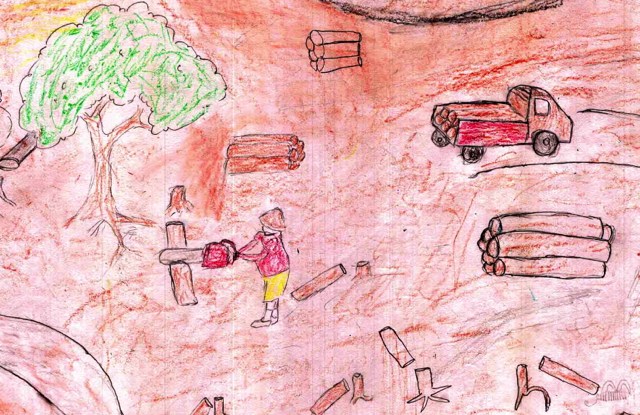BOGOR, Indonesia—In at least one way, it’s a place right out of a storybook.
A patch of Indonesian forest is the last ecosystem on Earth where nearly every iconic animal from Rudyard Kipling’s “The Jungle Book” still co-exists.
Unfortunately, there is no storybook ending in sight for the Leuser Ecosystem in steamy, mountainous northern Sumatra.
The current Aceh Spatial Plan—an expansion of the former Ladia Galaska road construction scheme—is slated to slice through highly sensitive areas of the Leuser Ecosystem in Sumatra’s Aceh and Northern Sumatra provinces.
The plan has been brought under scrutiny in a recently published article in PLOS One that examines the threat posed to endangered terrestrial mammals in Southeast Asia by specific roads.
AN ‘IRREPLACEABLE’ ECOSYSTEM
According to the study, the Ladia Galaska plan will threaten two of the three largest remaining Sumatran orangutan populations. Under current projections, continuation of the road construction project could result in an estimated loss of 1,384 of the remaining 6,600 Sumatran orangutans by 2030.
Despite several years of promising initiatives to safeguard the Leuser Ecosystem, changes in the political and economic landscape of the region have catalyzed development plans at the expense of conservation schemes.
It is not only the survival of Sumatran orangutans that is at stake. The Leuser Ecosystem is considered by the International Union for Conservation of Nature (IUCN) to be one of the “world’s most irreplaceable protected areas.”
The study adds more bad press to Aceh’s Spatial Plan, which has seen years of public criticism, including a petition signed by more than 1 million people in 2014 calling for its abolition.
“Having so many roads cutting through this big mountainous block of forest will completely fragment the area. And we’re already seeing it on the satellites,” said David Gaveau, a scientist with the Center for International Forestry Research (CIFOR) and a co-author of the study.
Gaveau, who has been studying the Leuser Ecosystem for more than five years, worries that his most grave projections for the fate of the area—and the fabled mammals within—are coming true.
In 2009, a study led by Gaveau projected three potential fates for the forest, based on factors such as the amount of new roads constructed, the competitiveness of carbon credit prices against the price of palm oil, and the success of the regional REDD+ project (a financial scheme to curb carbon emissions through avoided deforestation).

A map showing three possible scenarios for the Leuser Ecosystem in Sumatra, Indonesia (taken from Gaveau et al., “The future of forests and orangutans in Sumatra,” 2009). Click on the map to see a larger version.
Scenario 3 (pictured above, at right), in which road construction would be halted and REDD+ would be implemented across the province, “was a best-case scenario from the viewpoint of conservation, wildlife, and environment,” Gaveau said.
At the time, many conservationists saw reason for hope that such a scenario could be realized.
“Back in 2008 there was a lot of interest from the banking industry in carbon credits,” Gaveau said. “Not because they were after saving forests, but more because they were thinking of making big dollars. At the time, the U.S. was talking about establishing a cap-and-trade system, whereby it was mandatory for companies to reduce their emissions.”
The then-governor of Aceh, Irwandi Yusuf, spearheaded efforts to establish a functioning REDD+ program in the region as an alternative to deforestation-driven development plans, and was seen as a champion of conservation initiatives.
If we are talking about trade-offs between the environment and the economy, improving the existing coastal roads is a much better option
At the 2007 UN Climate Change conference in Bali, “they struck this agreement that [investment bank] Merrill Lynch would buy the carbon credits, [NGO] Flora and Fauna International would help the Government of Aceh establish all of its technical baselines to understand how much carbon they could actually sell, and [social entrepreneur] Dorjee Sun would act as a broker between all these entities,” Gaveau said.
EVEN-WORSE-CASE SCENARIO
Then, gradually, everything fell apart.
Merrill Lynch imploded in the 2008 financial crisis. Talk of a cap-and-trade system in the United States disappeared by 2010. Carbon prices stayed uncompetitively low. The REDD+ scheme floundered, and in 2011, the governor who had championed it delivered a final blow.
“A few months before stepping down from office, [Yusuf] granted a controversial oil-palm concession over important orangutan habitat,” Gaveau said.
“He did this out of frustration. He didn’t see one single dollar come into the local government coffers from this carbon credit, and he needed to do something for his people,” he added.
Six years later, “REDD+ is not being implemented,” Gaveau said. “Aceh’s new provincial government, led by Governor Zaini Abdullah, is pushing a new provincial land-use plan that is accelerating illegal logging and plantation development in the Leuser Ecosystem. The deforestation rate has gone up and the road construction has continued and expanded, so we are back to the worst-case scenario one: no REDD+ intervention, high rate of deforestation, and new roads are built.”
The Aceh Spatial Plan itself has never been formally approved by the Minister of Home Affairs as is required under Indonesian National Law, and experts say that it contravenes Aceh’s own Governance Law No 11 (2006) obligating Aceh’s Government to conserve the Leuser Ecosystem.
As things stand today, a further 16 percent decline in orangutan habitat and the loss of 25 percent of the current total population of Sumatran orangutans is likely in the next 15 years.
SLIPPERY SLOPE FOR HUMANS, TOO
Despite claims of popular support among locals for the previous Ladia Galaska road scheme, the environmental impact of the development of these roads—and their planned expansions in the new spatial plans—may be an economic cost not worth bearing.
By some estimates, the ecosystem services provided by the Leuser Ecosystem, such as protection from flooding and soil erosion, could total US$200 million.
New roads and increased deforestation in the Leuser Ecosystem will likely exacerbate environmental disasters—in an area that already suffers from frequent flooding (most recently in December 2014, which impacted thousands of residents across 17 districts).
“These roads will also probably be ravaged by these floods, and it is going to be very costly to repair these roads,” Gaveau said.
ALTERNATE ROUTES
When and where roads must be built, the recent study recommends that the construction projects be rerouted or modified whenever possible.
Gaveau sees this as a viable alternative to the Ladia Galaska scheme, which would be good for both people and wildlife.
“The area being a mountainous area, economically, Aceh would be better off improving the roads along the coast. If we are talking about trade-offs between the environment and the economy, improving the existing coastal roads is a much better option.”
For more information about this research, please contact David Gaveau at d.gaveau@cgiar.org.
CIFOR’s research in Southeast Asia forms part of the CGIAR Research Program on Forests, Trees and Agroforestry.
We want you to share Forests News content, which is licensed under Creative Commons Attribution-NonCommercial-ShareAlike 4.0 International (CC BY-NC-SA 4.0). This means you are free to redistribute our material for non-commercial purposes. All we ask is that you give Forests News appropriate credit and link to the original Forests News content, indicate if changes were made, and distribute your contributions under the same Creative Commons license. You must notify Forests News if you repost, reprint or reuse our materials by contacting forestsnews@cifor-icraf.org.

